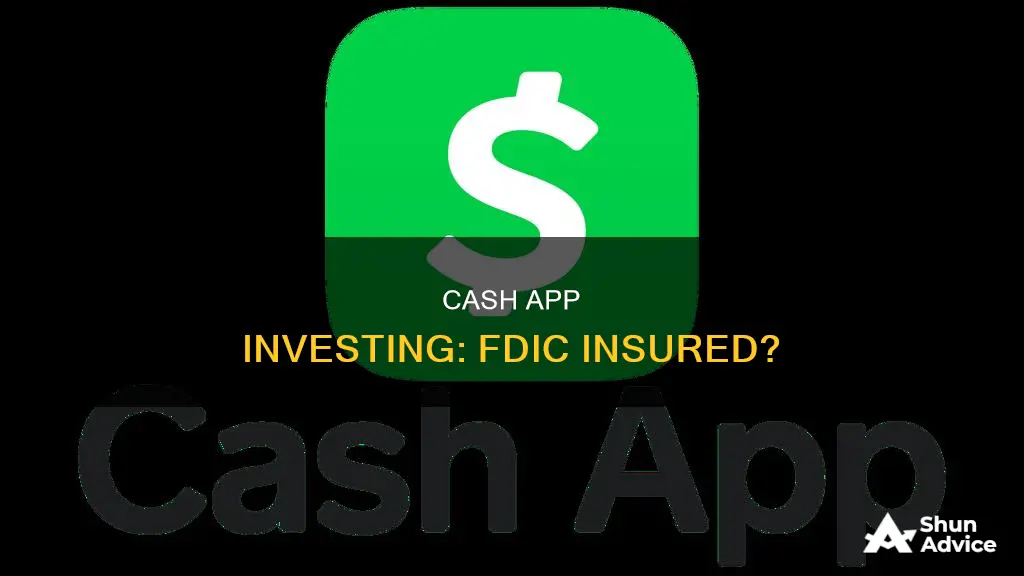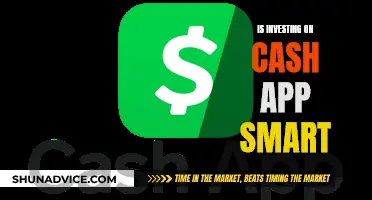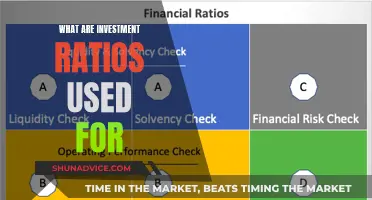
Cash App is a financial services application available in the US. It offers peer-to-peer money transfer, bitcoin and stock exchange, a personalised debit card, a savings account, short-term lending, and other services. The app has grown quickly, and currently has more than 50 million active users. But is Cash App FDIC insured and safe to keep your money in?
If you have a Cash Card, or are a sponsor of any active sponsored accounts, up to $250,000 of your cash and savings balances in Cash App is covered by FDIC insurance through their partner bank Wells Fargo Bank. All active sponsored accounts and their sponsors are also FDIC insured with or without a Cash App Card. However, it's important to note that Cash App, on its own, is not insured by the Federal Deposit Insurance Company.
| Characteristics | Values |
|---|---|
| Cash App Card | Covered by FDIC insurance through Wells Fargo Bank, N.A. and Sutton Bank, Members FDIC, for up to $250,000 per person. |
| Cash App Investing LLC | A Member of SIPC. Securities in your account are protected up to $500,000. |
| Bitcoin | Not covered by FDIC Insurance. |
What You'll Learn

Cash App Card and FDIC insurance
Cash App is a financial services platform that offers peer-to-peer money transfer, bitcoin and stock exchange, a personalised debit card, a savings account, and short-term lending, among other services. It is important to note that Cash App is not a bank, and banking services are provided by Cash App's bank partners.
If you have a Cash App Card, your cash and savings balances in the app are covered by FDIC insurance through their partner bank Wells Fargo Bank, N.A., Member FDIC. This means that up to $250,000 of your cash and savings balances are protected by the federal government if Wells Fargo Bank goes out of business. It is important to note that FDIC insurance does not cover individual transactions or fraud. Additionally, Bitcoin and investing balances are not covered by FDIC insurance.
If you don't have a Cash Card, your money held in the Cash App is not FDIC insured. This means that if Cash App goes out of business, you could lose any money in the account.
For Cash App users who are sponsors of any active sponsored accounts, their cash and savings balances are also covered by FDIC insurance, even without a Cash App Card. All active sponsored accounts and their sponsors are included under the same insurance coverage.
It is important to understand that Cash App provides a convenient way to manage your finances, but it does not replace a traditional or online bank with FDIC insurance. If you are looking for additional peace of mind, consider using a free checking account with no minimum balance requirements or an FDIC-insured bank account.
Understanding Cash Equivalents: A Guide to Investing Wisely
You may want to see also

Cash App's stock balances
Cash App Investing LLC is a subsidiary of Block, Inc. and a member of the Securities Investor Protection Corporation (SIPC). The SIPC protects securities in your Cash App Investing account up to $500,000.
The balance associated with your Cash App Investing account is different from your Cash App balance. This "stock balance" is the total current value of your investments. The securities in your Investing account are held by a third-party custodian, DriveWealth, LLC. The value of your Investing account is shown separately from your general Cash App balance.
If you have a Cash App Card, the money in your Cash App account balance is covered by the FDIC through partner banks (FDIC "pass-through" insurance) in the event of bank failure. The FDIC will cover eligible accounts up to $250,000 per Cash App customer. However, Bitcoin and investing balances are not covered by FDIC insurance.
Stock balances are protected by the SIPC. According to the Cash App website:
> "Your Cash App Balance funds may be eligible for FDIC insurance. The securities in your account are protected up to $500,000. For details, please see www.sipc.org. Cash App Investing does not hold your proceeds from the sale of stocks or ETFs. You authorize that proceeds from the sale of stocks or ETFs to be automatically transferred to your Cash balance, which is not SIPC-protected but may be FDIC protected."
Buyers' Strategies to Minimize Cash Outlay During Acquisitions
You may want to see also

Bitcoin balances
Cash App is a financial services application available in the US. It offers peer-to-peer money transfer, a bitcoin and stock exchange, a bitcoin on-chain and lightning wallet, a personalised debit card, a savings account, short-term lending, and other services.
If you have a Cash App Card, or are a sponsor of any active sponsored accounts, up to $250,000 of your cash and savings balances in the Cash App is covered by FDIC insurance through their partner bank Wells Fargo Bank, N.A., Member FDIC. All active sponsored accounts and their sponsors are also FDIC insured with or without a Cash App Card.
However, it is important to note that Bitcoin and investing balances are not covered by FDIC insurance. This means that if you have Bitcoin in your Cash App wallet, it is not protected by FDIC insurance. If the bank holding your funds fails, the FDIC will not cover your Bitcoin balance.
The FDIC only insures your cash balance in the event that the bank holding the funds fails. It does not protect individual transactions or provide coverage for fraud on individual transactions.
While Cash App does offer some protection for individual transactions, it is not a replacement for FDIC insurance. If you have an issue with a Cash App Card purchase, you can file a dispute or report a potential scam payment. Recognizing and avoiding scams can be helpful in preventing the need to file a claim.
In summary, while Cash App does provide FDIC insurance for cash and savings balances up to $250,000, Bitcoin and investing balances are not covered by this insurance.
Strategies for Investing Surplus Corporate Cash: A Comprehensive Guide
You may want to see also

Cash App's safety features
Cash App is a financial services platform that offers peer-to-peer money transfer, bitcoin and stock exchange, a personalised debit card, a savings account, and short-term lending. While Cash App is generally safe, it is not a bank and does not replace a traditional or online bank with FDIC insurance. Here are some of the safety features of Cash App:
FDIC Insurance
If you have a Cash App Card, or are a sponsor of any active sponsored accounts, up to $250,000 of your cash and savings balances in Cash App is covered by FDIC insurance through their partner bank Wells Fargo Bank, N.A., Member FDIC. All active sponsored accounts and their sponsors are also FDIC insured with or without a Cash App Card. The FDIC insures your balance in the event that the bank holding the funds fails.
Encryption and Fraud Detection Technology
Cash App uses advanced encryption and fraud detection technology to keep your data and money secure. Cash App also monitors accounts for anything out of the ordinary and will cancel potentially fraudulent payments, returning funds to your Cash App or linked bank account.
Two-Factor Authentication and Security Lock
Cash App offers two-factor authentication, which provides an additional layer of security beyond your account password. You can also enable Security Lock, which requires a PIN code, Touch ID, or Face ID before completing any payments.
Verified for Your Security
Cash App asks you to verify your identity to protect your account and keep the platform safe.
Notifications for Suspicious Activity
When sending money internationally or logging in from a new device, Cash App will ask you to confirm details only you would know to help keep your money and account secure.
Control Over Your Privacy
You control what information you share with other Cash App customers and who can request money from you.
Phone Support and Chat History
Phone support is available daily from 9 am to 7 pm ET, and the chat feature keeps a history of all your chats for quick and easy reference.
Safety Tips and Scam Support
Cash App publishes safety tips online and has a scam support page with details on how to recognize scams and keep your money safe.
Investing Without Cash: Strategies for Success
You may want to see also

Cash App vs traditional banks
Cash App is a financial services platform, not a bank. It is partnered with financial institutions to provide banking services. Cash App offers a range of services, including peer-to-peer money transfer, bitcoin and stock exchange, a personalised debit card, a savings account, and short-term lending.
One of the key differences between Cash App and traditional banks is that Cash App does not have any physical branches, so users cannot bank in person. However, this also means that Cash App is generally less expensive when comparing fees to traditional banks. Cash App also offers fewer fees and more investment services than traditional banks.
Another difference is that Cash App does not require users to have a bank account to create an account or add money to their Cash App balance. Users can deposit paychecks, tax returns, and cash into their Cash App balance without a bank account.
In terms of safety, Cash App offers FDIC insurance of up to $250,000 per account holder through its partner bank, Wells Fargo Bank. This insurance covers users who have a Cash Card or are sponsors of any active sponsored accounts. However, it is important to note that Bitcoin and investing balances are not covered by FDIC insurance.
Cash App also offers advanced security features, encryption, and fraud detection technology to protect user data and transactions.
While Cash App offers direct deposit, there are some differences from traditional banks. Cash App offers early direct deposits, with users receiving their paychecks up to two days earlier than many banks. Additionally, Cash App does not charge monthly or overdraft fees, and there are no balance minimums or activity requirements.
Overall, Cash App provides a convenient and accessible alternative to traditional banks, with fewer fees and more investment options. However, it may not be suitable for those seeking the full range of services offered by traditional banks or those who prefer in-person banking.
Strategies for Investing Cash Without IRS Attention
You may want to see also
Frequently asked questions
If you have a Cash App Card, or are a sponsor of any active sponsored accounts, up to $250,000 of your cash and savings balances in Cash App is covered by FDIC insurance through their partner bank Wells Fargo Bank. All active sponsored accounts and their sponsors are also FDIC insured with or without a Cash App Card. Bitcoin and investing balances are not covered by FDIC insurance.
If you don't have a Cash Card, your money is not FDIC insured. If Cash App goes out of business, you could lose any money in the account.
Your money may still be protected through the bank insuring it. Cash App follows regulations set forth by the Financial Conduct Authority, the organization it is authorized as an Electronic Money Institution through.
The FDIC (Federal Deposit Insurance Corporation) offers insurance on deposits by institution, meaning that if your bank goes out of business, your money is protected up to $250,000, per person.







